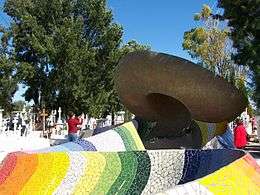José Alfredo Jiménez
José Alfredo Jiménez Sandoval (Spanish pronunciation: [xoˈse alˈfɾeðo xiˈmenes]; 19 January 1926 – 23 November 1973) was a Mexican singer-songwriter of rancheras, whose songs are considered an integral part of Mexico's musical heritage.[1]
José Alfredo Jiménez | |
|---|---|
| Birth name | José Alfredo Jiménez Sandoval |
| Also known as | "El Dios de la Música Ranchera", "El Padrino de la Música Ranchera", "El Poeta del Pueblo". |
| Born | 19 January 1926 Dolores Hidalgo, Guanajuato, Mexico |
| Died | 23 November 1973 (aged 47) Mexico City, Mexico |
| Genres | Regional Mexican, Canción ranchera, Corrido, Mariachi. |
| Occupation(s) | Singer-songwriter |
| Associated acts | |
Biography
Jiménez was born in Dolores Hidalgo, Guanajuato, Mexico.[1] According to the singer Miguel Aceves Mejía, he did not play an instrument and did not even know the Spanish word for "waltz" or what "keys" his songs were in.[2] Nonetheless, he composed more than 1,000 songs. Among the most famous are "Yo", Me equivoqué contigo", "Ella", "Paloma querida","Que se me acabe la Vida ", "Tú y la mentira", "Media vuelta", "El Rey", "Sin sangre en las venas", "El jinete", "Si nos dejan", "Amanecí en tus brazos", "Llegando a ti", "Tu recuerdo y yo", El hijo del pueblo", "Cuando el destino", "El caballo blanco", "Llegó borracho el Borracho" and "Que te vaya bonito", as well as "Camino de Guanajuato", where he sang about his home state of Guanajuato.

In addition to his own recordings, many of his songs have been recorded by renowned artists from around the Spanish-speaking world, most notably by the following artists: Selena, which she sang “Cuando Nadie Te Quiera”, Miguel Aceves Mejía,[1] Enrique Bunbury, Antonio Aguilar, Luis Aguilar, Lola Beltrán,[1] Vikki Carr, Gualberto Castro, Rocío Dúrcal, Alejandro Fernández, Pedro Fernández, Vicente Fernández, Los Relámpagos Del Norte con Cornelio Reyna y Ramón Ayala, Los Tigres del Norte, Manolo García, Little Joe Hernández & The Latinaires, Julio Iglesias, Pedro Infante,[1] the Mexican rock group Maná, Luis Miguel, Jorge Negrete,[1] Sunny Ozuna & The Sunliners, María Dolores Pradera, Javier Solís, and Chavela Vargas and Selena. In addition, Joaquín Sabina paid homage to Jiménez with his song, "Por el Bulevar de los Sueños Rotos" ("On the Boulevard of Broken Dreams"). The country artist Luke Tan recorded a disc of his favorite Jiménez songs in Spanish, including some English translations.
Like many of his contemporary stars, such as Jorge Negrete, Pedro Infante, and Javier Solís, Jiménez died young. He was only forty-seven years old when he died in Mexico City, of complications resulting from cirrhosis of the liver.[1]
One of his last appearances on Mexican television occurred in 1973, just months prior to his death, where he introduced his last song, "Gracias", accompanied by his wife, singer Alicia Juarez. It was his way of thanking the public for all of the affection they had shown him throughout his career as one of the most prolific and highly regarded composers and singers Mexico has ever produced.
Tribute
In 2018, Jiménez was posthumously awarded the Latin Grammy Award for Album of the Year for ¡México Por Siempre! by Luis Miguel. Jiménez received the accolade due to the fact six of the fourteen tracks in the album were composed by him, thus making Jiménez eligible for the award.[3]
In Mexico it has a Mausuleo popularly known as "Mausoleum of José Alfredo Jiménez".
On January 19, 2016, Google celebrated his 90th birthday with a Google Doodle.[4] Everything Mexican begins with a Jose Alfredo Jimenez Song;Deb Leticia Gordils," Jose Alfredo Jimenez songs have lasted for nearly 50 decades, after his death, like the legacies past down thru generations so are the old ranch tunes to Mexican children in every household on the North American continent. Prolific is a descriptive word that only scratches the surface to describe the value of his music to Mexicans and Americans of Mexican descent world wide." Viva la Ranchera!
Studio albums

- La Sota De Copas 1970
- El Cantinero•El Rey 1971
- Gracias 1972
- 15 Exitos Inolvidables De (1983) RCA Records
- 12 Exitos De Oro (1988) RCA Records
- Lo Esencial (2008) RCA/Lecacy Recordings
Filmography
- Here Comes Martin Corona (1952)
- La Sonrisa de los Pobres (1964)
References
- Colin Larkin, ed. (2002). The Virgin Encyclopedia of Fifties Music (Third ed.). Virgin Books. p. 221. ISBN 1-85227-937-0.
- "Jose Alfredo Jimenez". June 17, 2013. Archived from the original on June 17, 2013. Retrieved 25 October 2019.
- Gallegos, Armando (15 November 2018). "Pelean por un Grammy". Diario Basta! (in Spanish). Retrieved 16 November 2018.
- "José Alfredo Jiménez's 90th Birthday". Google. 19 January 2016.